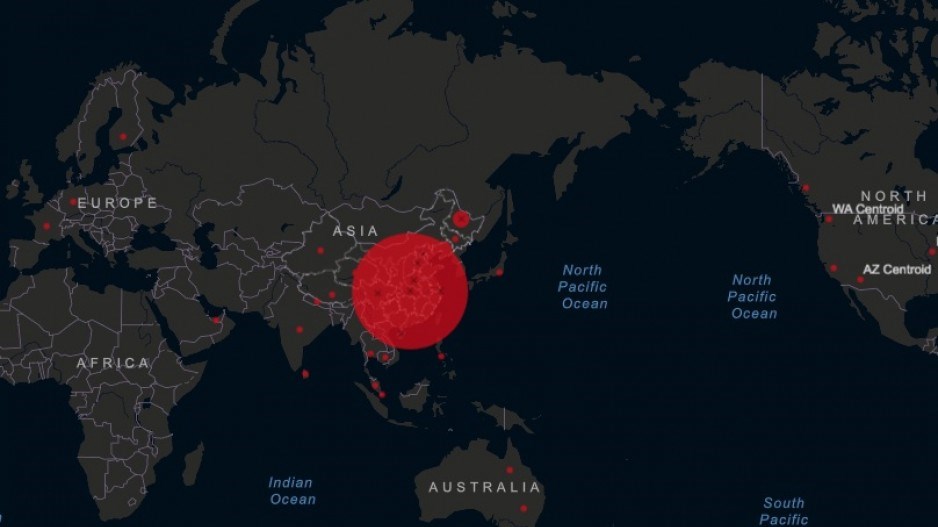What happened: The World Health Organization (WHO) on January 30 declared that the global outbreak of the novel coronavirus 2019-nCoV is a global health emergency.
Why this matters: The declaration provides justification for governments around the world to close border crossings, ban flights to China and heighten screening of in-bound travellers even though the WHO said that travel bans may not be the most effective way to control the spread of the disease.
Canada's chief public health officer Theresa Tam said on a conference call on January 30 that the declaration "doesn't really change what we do. We've been preparing ever since the outbreak started. We have already enhanced measures at our airports."
The Public Health Agency of Canada (PHAC) has put up signage at the airport to educate travellers, and is asking travellers at customs-kiosk machines whether they have been to Wuhan, China. If they respond that they have, Customs and border security officers ask them if they feel ill and rely on the traveller to be honest.
"We are relying on travellers to do the right thing," Tam said.
If travellers admit to feeling ill, they are to see health officials at the airport.
PHAC told BIV on January 29 that it has based 19 public health safety officials, or quarantine officers, at airports in Vancouver, Toronto and Montreal. It plans to add 14 additional officers by the end of the week. BIV has been asking PHAC for more than a week how many such officers are specifically at YVR, but it has yet to answer that question.
The virus, which started circulating in December in Wuhan China, has so far killed 171 people and infected 8,236 people, according to Johns Hopkins Whiting School of Engineering's website.
While all deaths are so far in mainland China, infections have also been reported in Hong Kong, Taiwan and 16 other countries.
Canada's federal lab in Winnipeg has conducted 101 tests so far, according to Tam. Of those, 58 tests came back negative, three were positive and Tam did not say what the status was for the other 40 tests so they are likely pending.
No Canadian citizens or permanent residents are hospitalized in Chinese hospitals, she said.
The WHO's declaration comes after meetings last week, when it said that the situation was not yet serious enough to call it a global emergency.
B.C.’s first official case of the coronavirus was confirmed January 29.
That first case is a man in his 40s who entered Canada through Vancouver International Airport (YVR) last week and on January 26 sought medical attention. He has stayed in isolation at his home as he is not to be ill enough to need hospitalization, according to B.C.'s provincial health officer Bonnie Henry.
Henry declined when asked to name the municipality in which the man resides. She would only say that he is in the Vancouver Coastal Health region – an area that includes Vancouver, Richmond, the North Shore, the Sea-to-Sky corridor, Sunshine Coast, Powell River, Bella Bella and Bella Coola.
The WHO's declaration may prompt an increase in countries that are closing borders or contemplating banning flights to China. Russia on January 30 closed much of its border with China. The U.S.' State Department heightened its travel advisory on January 30 and warned Americans not to travel to China. Earlier this week CNBC reported that White House officials warned airlines that they may suspend air travel to China.
Business in Vancouver asked Transport Canada if Canada is also contemplating suspending all air travel to China. Officials there passed the request to Health Canada, which has yet to respond.
Dozens of airlines around the world have voluntarily cancelled flights to China but, so far, Air Canada is the only airline that flies non-stop to mainland China from Vancouver and has cancelled all flights.
Mainland-China-based airlines Air China, China Southern Airlines, China Eastern Airlines, Beijing Capital Airlines, Sichuan Airlines, Xiamen Airlines and Hainan Airlines also fly non-stop between Vancouver and mainland China but have yet to publicly declare any flight cancellations.
YVR does not use temperature-screening devices on passengers, as it did in 2003, when a virus known as SARS was a global health emergency. That virus killed nearly 800 people and infected around ten times as many.
Vancouver Airport Authority CEO Craig Richmond told BIV last week that Health Canada provided the temperature-screening devices at the time, and that his airport authority is now following PHAC directives.




